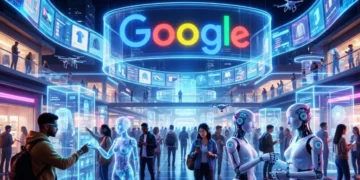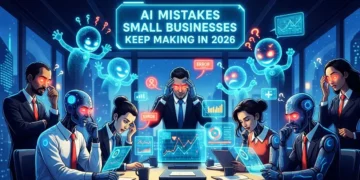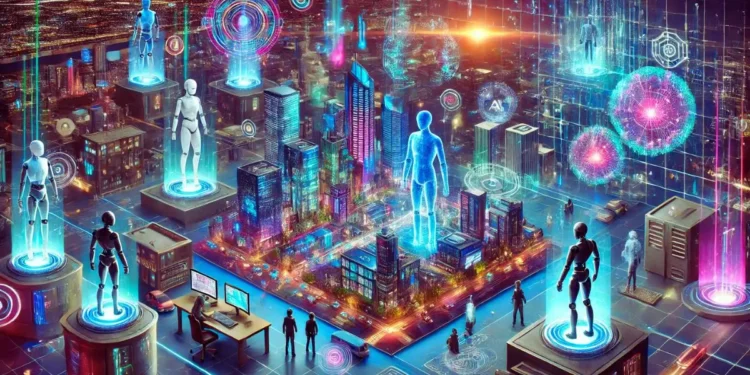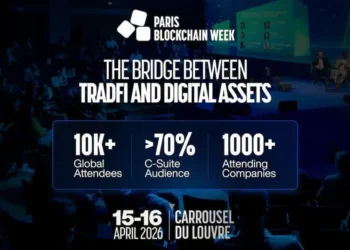Imagine a world where virtual reality (VR) and artificial intelligence (AI) blend seamlessly, creating immersive digital universes that feel as real as the physical one. This is no longer science fiction—the metaverse is evolving rapidly, and AI is the driving force behind its transformation.
But what does this mean for businesses, investors, and everyday users? Will the metaverse dominate our digital lives by 2026? How will AI shape its growth? And most importantly—how can you prepare for this technological revolution?
In this comprehensive guide, we’ll explore:
The future of the metaverse in 2026 and how AI is accelerating its development.
Key AI advancements that are making virtual worlds smarter and more interactive.
Investment opportunities in the metaverse, from virtual real estate to metaverse ETFs.
The relationship between AI and the metaverse—are they competing or complementary technologies?.
By the end, you’ll have a clear understanding of where the metaverse is headed and how AI will redefine digital experiences in the coming years.
Understanding the Connection Between AI and the Metaverse
What Is the Metaverse?
The metaverse refers to a collective virtual shared space, created by the convergence of virtually enhanced physical reality and persistent online worlds. It allows users to interact with each other and digital environments in immersive ways.
How Is AI Powering the Metaverse?
Artificial Intelligence (AI) acts as the backbone of many metaverse functions. From generating realistic avatars to powering natural language processing in virtual assistants, AI enhances user experience across platforms. In 2026, we’re seeing AI not just support the metaverse, but evolve alongside it.
Real-World Applications
Companies like Meta (formerly Facebook) are investing heavily in combining AI and metaverse technologies to create smarter, faster, and more adaptive virtual environments. For instance, Meta’s recent updates include AI tools that generate 3D objects from simple text prompts — a game-changer for creators and developers
The Future of the Metaverse in 2026: Beyond Gaming
How Will the Metaverse Evolve by 2026?
The metaverse in 2026 is expected to be far more than just a gaming hub. According to industry experts, it will become a fully integrated digital ecosystem for work, education, social interaction, and commerce.
Key trends shaping the future of the metaverse include:
Hybrid workspaces: Companies like Meta (Horizon Workrooms) and Microsoft (Mesh) are creating virtual offices where employees collaborate as avatars
AI-powered education: Universities are using VR simulations for medical training and 3D engineering models for hands-on learning
Social VR platforms: Apps like VRChat and Rec Room are redefining online interaction with immersive events and concerts
Immersive AI Avatars: More personalized and emotionally responsive avatars powered by AI.
Smart Virtual Economies: AI-managed marketplaces where digital goods are traded efficiently.
- AI-Powered Content Creation: Tools that allow anyone to build virtual assets using natural language commands.
Did you know? The global metaverse market is projected to reach $1.1 trillion by 2030, growing at a 39.3% CAGR
How Much Is the Metaverse Worth in 2026?
Analysts predict the metaverse’s valuation will skyrocket, with Citi forecasting a $13 trillion opportunity by 2030 4. In 2026, we can expect:
Mass adoption of VR/AR headsets (Meta Quest 3S, Apple Vision Pro)
Expansion of virtual economies (NFTs, blockchain-based assets)
AI-driven personalization, making digital experiences more lifelike
Is the metaverse just hype, or is it the next big thing? The numbers suggest it’s here to stay.
The Future of AI in 2026: Smarter, Faster, More Autonomous
How Will AI Transform the Metaverse?
AI is the backbone of the metaverse, enabling:
Generative virtual worlds: AI models like Google’s Genie 2 can create interactive 3D environments on the fly.
AI avatars with emotional intelligence: Future metaverse characters will understand and respond to human emotions.
Autonomous AI agents: These digital assistants will manage tasks, trade virtual assets, and even socialize on your behalf.
AI Beyond Chatbots
While many associate AI with chatbots and recommendation engines, its potential goes far beyond. In 2026, AI is becoming more context-aware and capable of handling complex tasks within the metaverse, such as:
- Real-time translation during global virtual conferences
- Dynamic content generation for personalized user experiences
- Intelligent moderation of virtual communities
These advancements make AI an essential component of any metaverse platform worth investing in.
How to Invest in the Metaverse: Opportunities and Strategies
Step 1: Understand the Ecosystem
Before diving into investments, it’s crucial to understand the different layers of the metaverse ecosystem:
Step 2: Choose Your Investment Vehicle
You can invest in the metaverse through:
- Stocks: Companies like Meta, NVIDIA, and Unity
- ETFs: Funds focused on metaverse-related companies
- NFTs: Digital land, wearables, and collectibles
- Startups: Early-stage companies developing AI-metaverse integrations
Pro tip : Look for projects that clearly explain how AI improves the metaverse experience — these tend to have higher growth potential.
Is AI the New Metaverse?
This is a question many industry insiders are asking. While AI is not the metaverse itself , it’s increasingly becoming the engine behind it. Think of AI as the brain, while the metaverse is the body — together, they create a living, breathing digital universe.
For example, AI helps interpret voice commands in VR headsets, generates photorealistic textures in seconds, and even moderates virtual spaces autonomously. These capabilities are pushing the boundaries of what was once thought possible.
While AI and the metaverse are closely linked, they serve different purposes:
AI enhances the metaverse by making it more intelligent and interactive.
The metaverse provides a playground for AI to evolve in simulated environments.
Fun fact: OpenAI’s “reasoning” AI models can now solve complex problems step-by-step, mimicking human thought processes
How to Invest in the Metaverse in 2026
Best Ways to Invest in the Metaverse
Interested in metaverse investments? Here’s how to get started:
1. Metaverse ETFs & Stocks
ARK Next Generation Internet ETF (ARKW) – Focuses on VR, AI, and blockchain.
Meta (Facebook), Microsoft, NVIDIA – Leading metaverse infrastructure developers.
2. Virtual Real Estate & NFTs
Platforms like Decentraland and The Sandbox allow you to buy, sell, and monetize virtual land.
NFTs (digital art, wearables) are becoming valuable metaverse assets.
3. AI & Metaverse Startups
Companies specializing in VR hardware, AI avatars, and blockchain are high-growth opportunities.
Pro Tip: Before investing, research market trends and regulatory risks—crypto volatility can impact metaverse assets.
The Relationship Between AI and the Metaverse
How Do AI and the Metaverse Work Together?
AI powers real-time translations in global metaverse meetings.
Generative AI creates dynamic virtual worlds (e.g., AI-designed game levels).
Neural interfaces (brain-computer links) may soon let us control the metaverse with thoughts.
Will AI replace human interaction in the metaverse? Unlikely—but it will enhance realism and personalization.
What Will the Metaverse Be in 5 Years?
Looking ahead to 2030, here’s what we can expect:
- Seamless Integration: AI and metaverse platforms will merge into unified ecosystems.
- Universal Access: Affordable VR/AR hardware will make the metaverse accessible to billions.
- Decentralization: Blockchain-based metaverse platforms will gain traction, offering true digital ownership.
How Much Is the Metaverse Worth in 2026?
Estimates suggest that the metaverse economy could be worth over $800 billion by 2026, with AI integration significantly boosting
that valuation. Sectors like gaming, retail, education, and healthcare are leading the charge.
Moreover, companies that leverage AI to enhance metaverse experiences are likely to see exponential growth. If you’re considering entering this space, now is the time to start exploring opportunities.
Is Meta Involved in AI?
Absolutely. Meta is heavily invested in AI research and development, particularly in areas that enhance its metaverse ambitions. Their latest AI models focus on improving:
- Natural language understanding
- Image and video synthesis
- Real-time interaction in virtual environments
Mark Zuckerberg has stated that Meta aims to build “the most advanced AI systems to power the next generation of computing” — a clear indicator of where the company is headed.
How Will AI Change the World in the Next 5 Years?
Beyond the metaverse, AI will transform industries in profound ways:
- Healthcare: AI-driven diagnostics and treatment personalization
- Education: Adaptive learning platforms tailored to each student
- Transportation: Fully autonomous vehicles integrated with smart cities
And in the metaverse? Expect AI to become the invisible hand guiding every aspect of digital life — from commerce to creativity.
Case Studies: Successful AI-Metaverse Integrations
Example 1: AI-Powered Virtual Shopping Assistants
Retailers like Gucci and Nike are already testing AI-driven virtual shopping assistants in their metaverse stores. These assistants understand customer preferences and offer personalized product recommendations in real time.
Example 2: AI-Generated Worlds
Tools like Runway ML and MidJourney are being used to generate entire virtual landscapes from text prompts. This capability reduces development time and costs, enabling smaller studios to compete with giants
What’s the Next Big Thing After AI?
While AI continues to evolve, the next frontier may well be the integration of AI with extended reality (XR), quantum computing, and emotional intelligence algorithms. These technologies will enable deeper, more intuitive human-machine interactions, especially within the metaverse.
While AI dominates tech trends, these innovations could follow:
Quantum computing – Solving problems beyond AI’s reach.
Brain-to-brain communication – Telepathic social networks.
Digital immortality – Preserving consciousness in AI avatars.
Could the metaverse outlast AI in popularity? Only time will tell.
FAQs
1. What is the future of the metaverse in 2026?
The metaverse in 2026 will expand beyond gaming into remote work, education, and social VR, powered by AI advancements.
2. What is the future of AI in 2026?
AI will become more autonomous, reasoning-based, and integrated into daily life, from AI assistants to scientific breakthroughs
3. How do you invest in the metaverse?
Options include metaverse ETFs, virtual real estate, NFTs, and tech stocks like Meta and NVIDIA
4. What is the relationship between AI and the metaverse?
AI enhances the metaverse by making interactions smarter, while the metaverse provides a testing ground for AI innovations
5. Is AI the new metaverse?
No—they are complementary technologies. AI powers intelligence, while the metaverse offers a digital universe to apply it
6. What will the metaverse be like in 5 years?
Expect hyper-realistic VR, AI-driven economies, and mainstream adoption in business and social life
7. Is Meta involved in AI?
Yes—Meta is investing heavily in AI for VR, smart glasses, and metaverse development
8. What’s the next big thing after AI?
Quantum computing, brain-computer interfaces, and biofabrication are emerging frontiers
9. How will AI change the world in the next 5 years?
AI will automate jobs, accelerate science, and personalize digital experiences at an unprecedented scale
10. How much is the metaverse worth in 2026?
Estimates suggest $146.6 billion in 2024, growing to $1.1 trillion by 2030
Conclusion
The intersection of AI and the metaverse is creating a digital revolution. Whether you’re an investor, tech enthusiast, or business leader, understanding these trends is crucial.
Key takeaways:
✔ The metaverse in 2026 will be more immersive and practical, thanks to AI.
✔ AI advancements like generative worlds and reasoning models will redefine virtual experiences.
✔ Investing in the metaverse can be profitable—but requires strategic research.







































